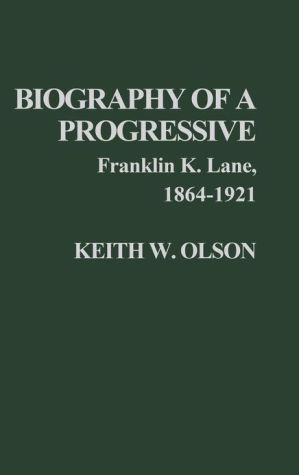

 |

|

The average rating for Biography of a progressive, Franklin K. Lane, 1864-1921 based on 2 reviews is 3.5 stars.
Review # 1 was written on 2012-06-21 00:00:00 James Chapman James ChapmanIf Leonard Wood had managed to become President of the United States he would have been the first to have been a doctor. Of all our presidents only William Henry Harrison studied medicine and he gave that up for the military. Born in New Hampshire to parents who could trace ancestry back to the Mayflower Wood went to Harvard and Harvard Medical School and then into private practice for a bit. He enlisted in the army medical corps and saw action and I mean combat action in the Apache Indian wars against Geronimo for which he got the Medal Of Honor. By that time he was a combat soldier. Still he returned to civilian life by which time his fame got him the post of personal physician to both Presidents Grover Cleveland and William McKinley. His real place in history was to come as the actual commander of the volunteer Rough Riders as McKinley wanted a man with actual military experience in charge with Theodore Roosevelt as the number 2. It was TR who got the lion's share of the glory, but Wood got his share as well and was Military Governor of Santiago after the war until our troops left. Afterward Wood saw service in the Phillipines. Wood and Roosevelt functioned well together, but sadly Wood embodied some of the darker side of TR, his jingoism and his absolute certainty of Anglo Saxon superiority. Under Taft he became Chief of Staff. Wood and TR were advocates of preparedness for the USA while Europe was engulfed in World War I. But Woodrow Wilson was not about to let Leonard Wood go overseas and gain any glory. Wood was given training assignments stateside. Wilson and everyone else knew Wood was interested in running for president in 1920. So he did and the three leading candidates Wood, Governor Frank O. Lowden of Illinois, and Senator Hiram Johnson of California deadlocked the convention and Warren Harding emerged and became the 29th president. For services rendered Leonard Wood was given the position of Governor-General of the Phillipines. It turned out to be a horrible choice. When the last of the rebellion was put down the various Governor-Generals took a very easy strain with the Filipinos. Geography and distance alone dictated that and it was an assumption in US policy that eventually they were to be independent and allies. Wood turned out to be a stern dictatorial kind of chief there and our relations with the Filipino people took several steps backward in the 20s. It was only stopped when Wood was replaced after having been diagnosed with a brain tumor which killed him in 1927. As scandal ridden as the Harding presidency was I think we dodged a bullet in this country when Leonard Wood did not become president. Read Jack C. Lane's book and study Wood's career and I think you'll agree. |
Review # 2 was written on 2007-07-17 00:00:00 Victor Theriault Victor TheriaultI have two takeaways from this very solid account of a man who was fairly well known in his own time but who is largely forgotten a century later. First, his forceful personality, arrogance, charisma, and ruthless ambition led to not only his greatest triumphs, but also his most significant disappointments. Wood was blatantly partisan, shamelessly self-promoting, and leaned heavily on his political network. He owed much, for example, to his friend Theodore Roosevelt (Wood commanded the famous Rough Rider regiment). He climbed to the top of the hierarchy as chief of staff of the Army without having attended West Point. His relentless criticism of Woodrow Wilson and his administration's military policies cost Wood not only a combat command in World War I but led him to being banished to training assignments far from the spotlight. Second, Wood was an able administrator. He demonstrated competency in his various military governorships, as well as army assignments. As chief of staff he initiated many long overdue, modernizing reforms, but his autocratic and divisive personality polarized the army. In the parlance of the twenty-first century, he had "sharp elbows" - in other words, he was skilled at internecine bureaucratic in-fighting. He was not a consensus-builder. |
CAN'T FIND WHAT YOU'RE LOOKING FOR? CLICK HERE!!!